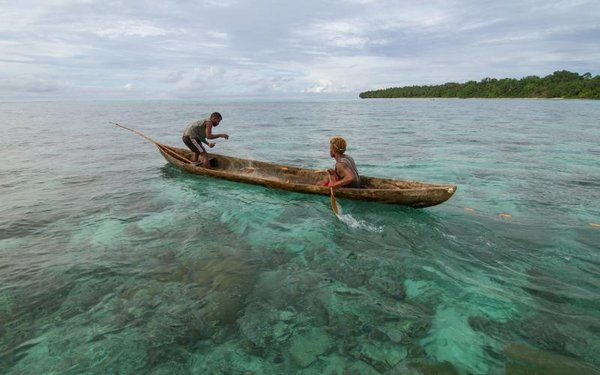 Read this article in French
Read this article in French- Share this article
- Subscribe to our newsletter
Aquatic foods offer a sea of opportunities to combat climate change
WorldFish’s research and innovation in climate-resilient and sustainably managed aquatic food systems present a unique opportunity for the production of nutritious and diverse foods that are healthy for people and the planet. The Intergovernmental Panel on Climate Change (IPCC) report, released on 10 February, emphasized the need for taking action now to secure the future of millions who are at the frontline of increasing climate risks.
Reacting to the IPCC report, WorldFish Interim Director General Essam Yassin Mohammed called on all stakeholders including citizens, governments and businesses to urgently join forces if humankind is to avert the climate crisis.
“The latest report reminds us that climate change is the problem of the day. It is not just about what may happen in the future,” said Mohammed. “It has become clear that those sections of our societies with limited or no financial and technical means to insulate themselves from the ill effects of climate change pay the highest price. Therefore, the climate crisis is a justice issue as much as it is ecological,” he added.
The IPCC AR6 report released in August last year concluded that climate change is widespread, rapid and intensifying, and the world is not on track to keep warming below 1.5 degrees Celsius. The report found that atmospheric carbon dioxide levels are the highest they’ve been in the last two million years, threatening the planet’s ability to sustain the human population. The latest IPCC 2022 Report on Impacts, Adaptation and Vulnerability assesses the present and future climate risks and presents options to act and adapt.
“I still remain hopeful that this is a battle we can win. We need to mobilise humankind’s best wit and intelligence and deploy our financial and technical resources to bend the curve and reverse the effects of climate change. However, time is not on our side. An immediate and collective action is needed if we were to stand a chance to avert the climate crisis,” urged Mohammed.
Putting food systems on a low-emissions pathway
According to WorldFish, aquatic foods -- diverse animals, plants, and microorganisms grown and harvested from water -- are central to the livelihoods, food and nutrition security of more than 800 million people in developing countries.
“Aquatic foods emit much lower greenhouse gases compared to land-based food systems. Sustainable management of aquatic animals and plants means stored carbon dioxide that would have otherwise been released into the atmosphere. Therefore, investing in sustainable management of aquatic ecosystems, transition to aquatic food-based diets offers a huge opportunity in putting our food systems on a low emissions pathway - delivering a triple win for nature, people and climate,” explained Mohammed who is also CGIAR Acting Senior Director of Aquatic Food Systems.
“To do so, significant investment in research and development of aquatic food sciences is needed to further enhance environmental benefits and deliver maximum benefit to people – both in terms of meeting nutritional needs and creating viable livelihood opportunities under changing climate,” he elaborated.
Mohammed is one of the co-authors of the report Compound climate risks threaten aquatic food system benefits, one of five initial scientific papers published as part of the Blue Food Assessment. WorldFish has been a key research contributor to the Blue Food Assessment, with seven of its scientists among the authors of the papers released.
Acknowledging that climate change is a threat to food systems everywhere, particularly to aquatic food systems, WorldFish is working on building climate-resilient food systems through research and innovation. WorldFish researchers are working to adopt a resilient systems approach to help small-scale aquatic food producers, traders and consumers adapt to a changing climate.
(WorldFish/wi)
More information:
IPPC report: Climate Change 2022: Impacts, Adaptation and Vulnerability
Publication: Compound climate risks threaten aquatic food system benefits
Related articles:
IPPC Climate Change Report – Impacts, Adaptation and Vulnerability
One Ocean Summit: Protecting maritime ecosystems





Add a comment
Be the First to Comment